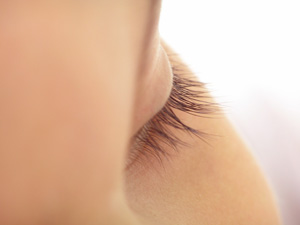Eyelid Rash

Common Causes of Eyelid Rash
Eyelid rash or eyelid dermatitis is very common due to the numerous chemicals and substances that we come in contact with on a daily basis. Everything from various beauty products and cosmetics, pollens, medications to common household cleaners and anything that may come in contact with the eye or the face may lead to symptoms of eyelid rash. Only in very rare cases will eyelid dermatitis result from internal problems within your body.
The best way to find what is causing your eyelid rash is to have an excellent history and an exacting exam of your skin. Sometimes a blood test can be performed in order to find what is causing your eyelid dermatitis. However, usually a blood test is performed only if the history results are poor or not providing enough information to clearly find the exact cause the eyelid rash.
Two types of eyelid irritation can occur. Products may be applied directly to the eyes causing a rash, or a general allergy can cause it. Atopic, or nonspecific, irritation affects individuals with general allergies such as hay fever, asthma, or eczema. They may experience eyelid dermatitis at some point due to an allergic reaction. It could be something as simple as a reaction to nickel found in earrings or a belt buckle, or it could be the result of an airborne allergen such as pollen. Atopic irritation of the eyelid most commonly starts on the upper eyelid and often occurs in only one eye.
Allergic contact dermatitis is an eyelid rash that forms on the bottom eyelid of both eyes, and it is most likely due to an allergen from a product such as a cosmetic or cream. Because these products are generally applied to both eyes, it is usually rather easy to determine that a product caused the infection. The area where the irritant was applied will be red, scaly, itchy, and/or painful. Some common causes of allergic eyelid rashes are listed below:
- Nail polish - One of the most common causes for eyelid dermatitis among women involves nail polish. Although it may sound strange, a tiny speck of wet nail polish on the eyelid can cause quite an infection. The eyelid may become red, scaly, itchy, and painful.
- Cosmetics - Another common source of eyelid rash among women involves the use of eye cosmetics. Even when a person has used the same product for many years, they may develop an allergy to the product, or the manufacturer may change the formula, resulting in an infection. Bacteria can also grow in makeup and cause eyelid dermatitis. For this reason, you should never leave your makeup in your car, where it will become hot and bacteria can grow at astronomical rates.
- Nickel - As noted above, an allergic reaction to nickel can result in an eyelid rash, even if the metal does not touch your eye. Earrings containing nickel, belt buckles touching your skin, or buttons can be the culprit.
- Neomycin - A common antibacterial cream applied to speed healing of cuts, neomycin or bacitracin can cause scaly, red patches on the eyelid.
- Latex Rubber - An allergy to latex rubber can cause the eyelids to swell and can cause an eyelid rash. Most often, these allergies will appear in people who have frequent contact with latex rubber gloves, such as health care workers and food industry workers.
These are just some of the most common causes of eyelid rash seen by doctors. When in doubt, visit the doctor. He can prescribe some medications that should clear up the infection, and he can rule out some more serious causes of the infection, such as skin cancer.